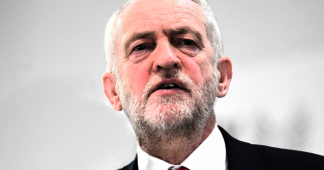TOM PIRSCIONEK recommends a meticulous account of the campaign that brought down Jeremy Corbyn
Weaponising Anti-Semitism: How the Israel Lobby Brought Down Jeremy Corbyn
Asa Winstanley, OR Books, £14.99
IN this meticulously researched book, journalist Asa Winstanley probes a taboo topic avoided by the mainstream press and even by some stalwart left-wing activists.
Weaponising Anti-Semitism describes how numerous Labour Party activists and former leader Jeremy Corbyn were falsely accused of being anti-semites or tolerating anti-semitism. Winstanley dismantles these allegations piece by piece and dispels the myth that anti-semitism was in any way endemic within Labour under Corbyn’s leadership.
The author cuts through aspersions and accusations with facts.
Winstanley explains that despite Corbyn being a committed anti-racist, supporter of justice for all peoples including Palestinians, and a left-wing Labour MP, this did not previously perturb the establishment who never believed he might one day hold the reins of power in Labour.
Corbyn’s unexpected election as party leader in 2015 was followed by a massive growth in Labour’s membership, swelling numbers to over 500,000, making Labour the largest political party in Western Europe at the time. Furthermore, many longstanding members felt reinvigorated by a leader to whom they could relate.
Despite being hugely popular amongst the rank and file, Winstanley reveals that Corbyn’s election risked upsetting two established constants within Labour which any party leader was required to maintain, namely to hold a pro-Israel stance and not be too critical of capitalism.
Winstanley methodically explains how Corbyn’s election set in motion a massive smear campaign designed to tarnish his image. To this end pro-zionist activists within Labour (some of whom had previously been employed by or had links with the Israeli embassy) worked relentlessly to pump out endless disinformation about Corbyn and his allies in order to weaken their party leader’s reputation and position within Labour.
Winstanley explains that a particularly underhand tactic was to create a false equivalence whereby any criticism of Israel’s treatment of Palestinians or of zionist ideology was conflated with anti-semitism and an attack on Jewish identity. He lists individuals that found themselves under investigation or even expelled from Labour despite no evidence of anti-semitic behaviour.
His description evokes the “red scare” of the McCarthy era.
A key point is that pro-Israeli activists and lobbyists did not operate in a vacuum. They might not have succeeded but for the unconditional support of right-wing Labour MPs who were happy to damage their party’s electoral chances by undermining and deposing their leader. Moreover, Winstanley shows how the mainstream British media played a major role in amplifying the baseless claims that anti-semitism had taken root in Labour under Corbyn’s leadership and unquestioningly used unverified reports.
Interestingly, research later showed that the greatest amount of misinformation did not come from right-wing news sources but rather from supposedly liberal media outlets.
When unsubstantiated allegations of anti-semitism emerged, rather than examining the facts and dismissing accusations that did not stand up to scrutiny, Labour’s bureaucracy took prompt action against the accused. Such investigations were used in turn to fuel the idea of a (non-existent) anti-semitism crisis within Labour.
Whilst the membership was strongly behind Corbyn, his failure to challenge or stop the unjust suspension of several high-profile party figures proved an error in judgement, suggests Winstanley, as the rank and file then began to question Corbyn himself.
Corbyn tried to compromise with his enemies, making him appear weak and only encouraging further attacks. Winstanley identifies this as a second error, suggesting that had Corbyn assertively acted against disloyal MPs and vehemently pushed back against allegations of anti-semitism, his enemies might not have succeeded.
Winstanley demonstrates how quickly and forcefully the state apparatus can be mobilised against a politician, even a popular one, who steps outside the bounds of what the establishment considers acceptable. Winstanley has created a historical document that shows how an emerging mass movement was defeated by a combination of the media, the establishment, self-serving Labour MPs, and lobby groups who worked in concert to subvert democracy.
Weaponising Anti-Semitism is required reading.
Also read
Robert Kennedy surrenders to the Lobby
Mais que se passe-t-il entre le Crif et Jean-Luc Mélenchon ?
We remind our readers that publication of articles on our site does not mean that we agree with what is written. Our policy is to publish anything which we consider of interest, so as to assist our readers in forming their opinions. Sometimes we even publish articles with which we totally disagree, since we believe it is important for our readers to be informed on as wide a spectrum of views as possible.











